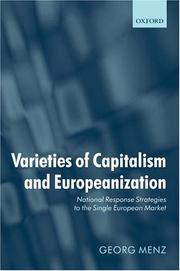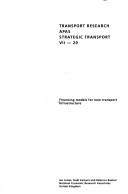| Listing 1 - 10 of 23 | << page >> |
Sort by
|
Book
ISSN: 11447753 ISBN: 9782200272210 2200272219 Year: 2012 Publisher: Paris Colin
Abstract | Keywords | Export | Availability | Bookmark
 Loading...
Loading...Choose an application
- Reference Manager
- EndNote
- RefWorks (Direct export to RefWorks)
Ce manuel inédit rapproche l'analyse économique et le monde naturel. Il actualise les grandes notions développées en matière d'économie des ressources naturelles et de l'environnement et étudie les avancées contemporaines de l'économie écologique. Il montre comment combiner le maintien d'un environnement vivable, le développement économique et une organisation sociale équitable. Il présente les méthodes de valorisation économique des écosystèmes et de la biodiversité. Il traite de la question de la justice et des inégalités environnementales.
Environmental economics --- 355 --- Milieu --- Environmental economics - European Union countries

ISBN: 0275956172 Year: 1999 Publisher: Westport, Conn. London Praeger
Abstract | Keywords | Export | Availability | Bookmark
 Loading...
Loading...Choose an application
- Reference Manager
- EndNote
- RefWorks (Direct export to RefWorks)
Book
ISSN: 11447753 ISBN: 9782200611767 2200611765 Year: 2015 Publisher: Paris : A. Colin,
Abstract | Keywords | Export | Availability | Bookmark
 Loading...
Loading...Choose an application
- Reference Manager
- EndNote
- RefWorks (Direct export to RefWorks)
La nouvelle édition de ce manuel rapproche l'analyse économique et le monde naturel. Il analyse les grandes notions d'économie des ressources naturelles et de i' environnement et étudie les avancées contemporaines de l'économie écologique. La question de la justice et des inégalités environnementales est au coeur de cet ouvrage. Comment combiner le maintien d'un environnement vivable, le développement économique et une organisation sociale équitable ? Les auteurs proposent ainsi des perspectives sur ce que pourraient être les nouveaux chemins de la prospérité Enfin, ils présentent les méthodes de valorisation économique des écosystèmes et de la biodiversité.
Environmental economics --- Ecology --- Sustainable development --- Economie de l'environnement --- Ecologie --- Développement durable --- Textbooks --- Economic aspects --- Manuels d'enseignement supérieur --- Aspect économique --- Développement durable --- Manuels d'enseignement supérieur --- Aspect économique --- Textbooks. --- Environmental economics - European Union countries
Book
ISBN: 9264032037 9264032045 Year: 2007 Publisher: Paris : OECD,
Abstract | Keywords | Export | Availability | Bookmark
 Loading...
Loading...Choose an application
- Reference Manager
- EndNote
- RefWorks (Direct export to RefWorks)
Der Bericht liefert eine umfassende volkswirtschaftliche Analyse des Euroraums. Die Wirtschaftsberichte entstehen im Rahmen einer Peer Review und enthalten konkrete Empfehlungen für die Wirtschaftspolitik des untersuchten Landes. Diese Empfehlungen spiegeln den Konsens der OECD-Mitgliedsländer wider. Der Bericht erscheint alle eineinhalb bis zwei Jahre. Der Bericht enthält konkrete Empfehlungen für die Wirtschaftspolitik und untersucht, ob der Aufschwung nachhaltig ist. Die einzelnen Kapitel behandeln den Umgang mit der Diversität, die Geldpolitik und die Fiskalpolitik.
Economics -- European Union countries. --- Electronic books. -- local. --- European Union countries -- Economic conditions. --- European Union countries -- Economic policy. --- Economics --- European Union countries --- Economic conditions. --- Economic policy. --- Economic theory --- Political economy --- Social sciences --- Economic man
Book
ISBN: 1462380050 1451990340 1283515474 1451910819 9786613827920 Year: 2007 Publisher: Washington, D.C. : International Monetary Fund,
Abstract | Keywords | Export | Availability | Bookmark
 Loading...
Loading...Choose an application
- Reference Manager
- EndNote
- RefWorks (Direct export to RefWorks)
Recent studies conclude that the ongoing global financial integration may have had little or no value in advancing economic growth, especially in poor countries. Capital is often found to flow "uphill" from poor to rich countries. And, when it does flow into the less developed economies, it is negatively correlated with growth, calling into question the desirability of foreign capital. In this paper we report that Europe-including the new member states of the European Union-provides a counterexample to these global anomalies. With increasing financial integration, capital in Europe has traveled "downhill" from rich to poor countries, and has done so with gathering strength. These inflows have been associated with significant acceleration of income convergence.
Balance of payments -- European Union countries -- Econometric models. --- Balance of payments -- European Union countries. --- Convergence (Economics) -- European Union countries -- Econometric models. --- Convergence (Economics) -- European Union countries. --- Exports and Imports --- Finance: General --- Macroeconomics --- Current Account Adjustment --- Short-term Capital Movements --- General Financial Markets: General (includes Measurement and Data) --- Personal Income, Wealth, and Their Distributions --- International economics --- Finance --- Financial integration --- Current account deficits --- Personal income --- Current account --- Current account balance --- Balance of payments --- International finance --- Income --- United States --- International finance.
Book
ISBN: 1462370004 1452717877 1283515814 1451907141 9786613828262 Year: 2005 Publisher: Washington, D.C. : International Monetary Fund,
Abstract | Keywords | Export | Availability | Bookmark
 Loading...
Loading...Choose an application
- Reference Manager
- EndNote
- RefWorks (Direct export to RefWorks)
In this paper, we revisit the effects of government spending shocks on private consumption within an estimated New-Keynesian DSGE model of the euro area featuring non-Ricardian households. Employing Bayesian inference methods, we show that the presence of non- Ricardian households is in general conducive to raising the level of consumption in response to government spending shocks when compared with the benchmark specification without non-Ricardian households. However, we find that there is only a fairly small chance that government spending shocks crowd in consumption, mainly because the estimated share of non-Ricardian households is relatively low, but also because of the large negative wealth effect induced by the highly persistent nature of government spending shocks.
Consumption (Economics) -- European Union countries -- Econometric models. --- Crowding out (Economics) -- European Union countries -- Econometric models. --- Electronic books. -- local. --- European Union countries -- Appropriations and expenditures -- Econometric models. --- Fiscal policy -- European Union countries -- Econometric models. --- Macroeconomics --- Public Finance --- National Government Expenditures and Related Policies: General --- Macroeconomics: Consumption --- Saving --- Wealth --- Labor Economics: General --- Fiscal Policy --- Personal Income, Wealth, and Their Distributions --- Public finance & taxation --- Labour --- income economics --- Expenditure --- Consumption --- Labor --- Fiscal policy --- Disposable income --- Expenditures, Public --- Economics --- Labor economics --- National income --- United States --- Consumption (Economics) --- Crowding out (Economics) --- Econometric models. --- European Union countries --- Appropriations and expenditures --- Income economics

ISBN: 0199273863 9786610755219 019156415X 1280755210 1423770994 9780199273867 0199551030 9780199551033 Year: 2005 Publisher: [Place of publication not identified] Oxford University Press
Abstract | Keywords | Export | Availability | Bookmark
 Loading...
Loading...Choose an application
- Reference Manager
- EndNote
- RefWorks (Direct export to RefWorks)
Europeanization has often been conceived as a top-down process, necessitating implementation and adjustment at the national level. However, Europeanization can also be conditioned by bottom-up national initiatives. While recent endeavors in comparative political economy have emphasized the resilience of coordinated market economies, few detailed empirical studies have examined to date exactly how different European systems of political-economic governance cope with and respond to an European impetus for liberalization. This original study of the impact of the EU-induced liberalization of service provision on member states argues that innovative national re-regulatory strategies may be implemented in response to Europeanization. In permitting any company registered in an EU member state to provide services throughout Europe, new possibilities were created for the transnational posting of workers from low-wage to high-wage countries. However, high-wage countries could re-regulate the wage levels applicable to such employees.; The exact nature of such response strategy is coloured by the respective institutional power that labour market interest associations like trade unions and employer associations command. Therefore, different institutionalised varieties of capitalism generate distinct re-regulations of the Single European Market. Drawing on detailed case studies of ten European countries, this volume bridges the gap between the rapidly unfolding scholarly debate on Europeanization and varieties of capitalism. It argues that both strongly neocorporatist systems of political-economic governance and statist systems are capable of creating swift, comprehensive and thorough national re-regulations. This applies to Austria and France, but also Sweden, Denmark, Norway, Finland, Belgium, and Luxembourg. By contrast, countries with less strongly embedded neocorporatist structures, in which due to organizational deficiencies trade unions face difficulties blocking employer demands, create liberal response strategies, permitting a stratification of wage levels. Hence, both Germany and the Netherlands implemented liberal business-friendly re-regulations.; The volume makes the case for important amendments to existing accounts of Europeanization and varieties of capitalism. Scholars of Europeanization need to incorporate bottom-up re-regulation into their conceptual framework, particularly in response to 'negative integration'. Recent strides in comparative political economy have placed great emphasis on continued divergence, yet this study suggests that even within the presumably unified group of 'non-liberal' coordinated market economies important institutional differences produce very distinct responses in the face of European liberalization.
Convergence (Economics) --- Capitalism --- Industrial policy --- Rapprochement (Economie) --- Capitalisme --- Politique industrielle --- #SBIB:327.7H231 --- Europese Unie: sociaal-economisch beleid, landbouw-, milieu-, cultuur- en communicatiebeleid --- E-books --- Industrial Management --- Economic History --- Management --- Business & Economics --- Market economy --- Economics --- Profit --- Capital --- Economic convergence --- Convergence (Economics) - European Union countries --- Industrial policy - European Union countries.
Book
ISBN: 9780754679295 0754679292 9780754698340 0754698343 9781315616285 9781317033479 9781317033486 Year: 2009 Publisher: Farnham : Ashgate,
Abstract | Keywords | Export | Availability | Bookmark
 Loading...
Loading...Choose an application
- Reference Manager
- EndNote
- RefWorks (Direct export to RefWorks)
This comparative book investigates the impact that the EU has on regionalization elsewhere through its inter-regional relations. Covering agriculture, trade, ASEAN, NAFTA, MERCOSUR and Commonwealth amongst other topics, it investigates whether the EU's contributions, both direct and indirect, to increased regional integration in different parts of the world.
Interregionalism --- Regional disparities --- Regional economics --- Regional planning --- European Union countries --- Foreign relations --- Politics and government --- Régionalisme (politique internationale) --- Union européenne --- Influence --- Pays de l'Union européenne --- Disparités régionales --- Relations extérieures --- Foreign relations. --- Politics and government. --- European Union countries --Foreign relations. --- European Union countries --Politics and government. --- Interregionalism --European Union countries. --- Regional disparities --European Union countries. --- Regional economics --European Union countries. --- Regional planning --European Union countries. --- International Relations --- International Cooperation --- International Law --- Law, Politics & Government --- Relations extérieures. --- Influence. --- Interregionalism - European Union countries --- Regional disparities - European Union countries --- Regional economics - European Union countries --- Regional planning - European Union countries --- European Union countries - Foreign relations --- European Union countries - Politics and government --- Régionalisme (politique internationale) --- Relations extérieures --- Disparités régionales --- Union européenne

ISBN: 9282758362 9789282758366 Year: 1996 Volume: 20 Publisher: Luxembourg EUR-OP
Abstract | Keywords | Export | Availability | Bookmark
 Loading...
Loading...Choose an application
- Reference Manager
- EndNote
- RefWorks (Direct export to RefWorks)
Transport. Traffic --- Infrastructure (Economics) --- Infrastructures de transport --- Transportation --- Finance --- -Transportation --- -#A9803A --- Public transportation --- Transport --- Transportation, Primitive --- Transportation companies --- Transportation industry --- Locomotion --- Commerce --- Communication and traffic --- Storage and moving trade --- Capital, Social (Economics) --- Economic infrastructure --- Social capital (Economics) --- Social infrastructure --- Social overhead capital --- Economic development --- Human settlements --- Public goods --- Public works --- Capital --- Economic aspects --- #A9803A --- Finances --- Transports aériens --- Union européenne --- Transportation - European Union countries - Finance --- Infrastructure (Economics) - European Union countries --- Infrastructure --- Partenariat ppp --- Transport ferroviaire
Book
ISBN: 9282315681 9789282315682 Year: 2001 Volume: 111 Publisher: Luxemburg EUR-OP
Abstract | Keywords | Export | Availability | Bookmark
 Loading...
Loading...Choose an application
- Reference Manager
- EndNote
- RefWorks (Direct export to RefWorks)
Economic geography --- European Union --- Regional planning --- Infrastructure (Economics) --- European Union countries --- Economic conditions --- Congresses --- -Regional planning --- -Regional development --- State planning --- Human settlements --- Land use --- Planning --- City planning --- Landscape protection --- Capital, Social (Economics) --- Economic infrastructure --- Social capital (Economics) --- Social infrastructure --- Social overhead capital --- Economic development --- Public goods --- Public works --- Capital --- Government policy --- -EU countries --- Euroland --- Europe --- -Congresses --- -European Union countries --- -Economic conditions --- Regional disparities. --- Regional planning - European Union countries --- Infrastructure (Economics) - European Union countries --- European Union countries - Economic conditions - Congresses --- EUROPE --- POLITIQUE REGIONALE
| Listing 1 - 10 of 23 | << page >> |
Sort by
|

 Search
Search Feedback
Feedback About UniCat
About UniCat  Help
Help News
News